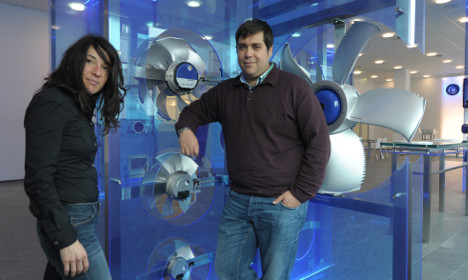The Cologne Institute of Economic Research estimates that by 2029, the country could have a shortfall of about 250,000 engineers.
Economic and demographic changes are expected to contribute to the shortfall, including the shrinking workforce as baby-boomers retire, drops in student enrollment in technical fields and an ever-expanding economy that demands a more robust, skilled labour force.
“Without immigrants, the lack of engineers cannot be fixed,” the economic institute wrote in April.
“Germany needs on the one hand more students from abroad who will study here and be motivated to stay after their exams. On the other hand, we need an increase in immigrants who are already trained and who will stay for the long run.”
The federal government has also called for efforts to attract the “right” kind of highly-skilled migrants – as the interior minister described it – to fill the labour void.
“The job market in Germany is developing altogether very well and substantially,” career adviser Anja Robert told The Local. “Those most in demand before anyone are software experts and engineers with international backgrounds.”
But what does it take to stand out as a non-German seeking an engineering job? According to Robert, having an extra edge of German integration might make the difference.
'Know your way around German culture'
“If you want to work for a company in Germany, you should speak German, but also English,” Robert told The Local. “Germany is regarded as a world leader in exports and makes about 40 percent of its sales abroad, so English is definitely spoken in businesses… but the everyday language is German, so in order to communicate in the canteen, administrative offices or with colleagues, you should know German.”
Robert, a career adviser at Germany’s largest technical university, RWTH Aachen University, said that it's not only the German language that is important to know.
“It’s also important to know your way around German culture,” she said.
“Germany is a very open and tolerant land. Opinions of others are accepted and encouraged. There are no open differences between men and women, or between religions and ethnicities.
“But there are hierarchies in businesses that have to be observed and typical German values like punctuality, reliability, responsibility and diligence.
“With this mixture of international people, openness and German virtues, it can sometimes lead employees from abroad to feel irritated.”
Attractive for engineering students
Germany is already a highly-attractive country for young engineers outside the country. A study published recently showed that Europe-wide, German companies made up half of the top ten list of places where European engineering students said they wanted to work.
Another recent study showed that for the foreign students flocking to Germany in record numbers, engineering is one of the most-studied subjects and has seen great increases in the number of students enrolling from abroad.
One way to gain more experience in Germany and thus be more attractive to employers is to participate in training programmes or internships in the country as a student, Robert explained.
“Learn German, and learn more about Germany – that’s how you can summarize the formula for success for getting a foothold in the German workforce.”



 Please whitelist us to continue reading.
Please whitelist us to continue reading.
Member comments